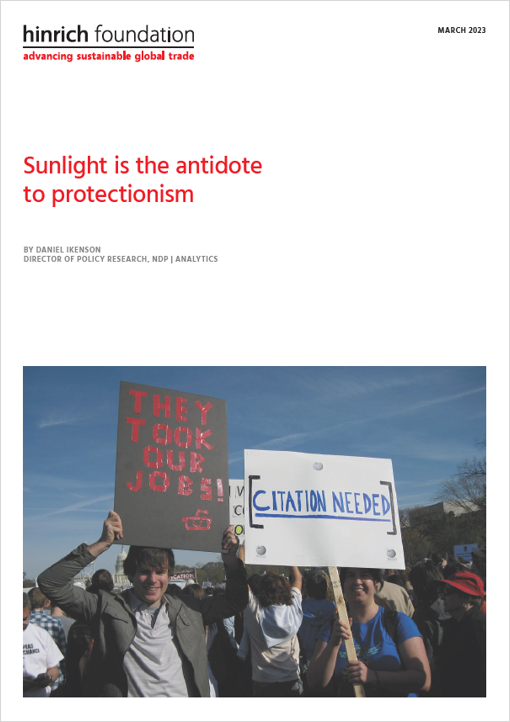Trade distortion and protectionism
Sunlight is the antidote to protectionism

Published 07 March 2023
The allure of protectionism, despite abundant evidence of its pitfalls, speaks to some enduring misconceptions about trade. With economic discrimination threatening growth and global stability, governments should make it easier for themselves to stand up to protectionism by empowering domestic bodies to provide transparent information about the benefits and costs of trade policies.
The year 2008 was a watershed for the global economy, not only because international trade and cross-border investment flows plummeted, but because it exposed weaknesses in the prevailing world order.
As the world enters a new era of "strategic reglobalization", mercantilism is making a comeback: trade is once again characterized as a competition between countries, and protectionism a form of patriotic measure.
For many decades, the US antidumping regime has affected billions of dollars in global trade and hundreds of industries, while evading the proper scrutiny it requires. Its convoluted technical complexities prevent all but a few insiders and experts from understanding the reality that underlies the rhetoric of "fairness" and "level playing field" – a justification echoed with bipartisan support in Washington. Daniel Ikenson of ndp | analytics shows how protectionism could easily translate into higher costs for consumers and domestic producers. Ikenson argues that protectionism is often the default choice because policymakers hear disproportionately from parties seeking those outcomes. Commitments to domestic transparency arrangements can help governments prioritize public interests when rendering policy decisions on trade.
Download Sunlight is the antidote to protectionism by Daniel Ikenson:

© The Hinrich Foundation. See our website Terms and conditions for our copyright and reprint policy. All statements of fact and the views, conclusions and recommendations expressed in this publication are the sole responsibility of the author(s).
Author
Daniel Ikenson
Daniel Ikenson is an economist and renowned international trade expert who has spent over 30 years analyzing, communicating, and influencing the formulation of US and global trade policy. In 2021, Daniel joined ndp | analytics after nine years as director of the Cato Institute’s Center for Trade Policy Studies, where he led a team of lawyers, economists, and political scientists conducting research on all manner of trade policy.
Have any feedback on this article?
Related Articles

Strategic reglobalization: Great power rivalry comes for the multilateral trading system
26 October 2022

Mercantilist reciprocity or free trade: Globalization at a crossroads
19 October 2021

Trade and development in an age of crisis: Mind the fundamentals
15 February 2022

Strategic reglobalization: Great power rivalry comes for the multilateral trading system
26 October 2022

Mercantilist reciprocity or free trade: Globalization at a crossroads
19 October 2021

Trade and development in an age of crisis: Mind the fundamentals
15 February 2022

Strategic reglobalization: Great power rivalry comes for the multilateral trading system
26 October 2022

Mercantilist reciprocity or free trade: Globalization at a crossroads
19 October 2021

